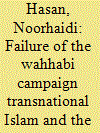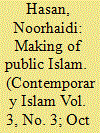| Srl | Item |
| 1 |
ID:
101348


|
|
|
|
|
| Publication |
2010.
|
| Summary/Abstract |
The Salafi madrasa has evolved in Indonesia as a consequence of Saudi Arabia's immensely ambitious global campaign for the Wahhabization of the Muslim umma. Demonstrating the importance of transnational networks in shaping the current dynamics of Indonesian Islam, the madrasa appears to be the centre of excellence for the Salafi protagonists to spread Saudi-style Wahhabi Islam among Indonesian Muslims at the grass-roots level. Its curriculum places an emphasis on the teaching of tawhid, or more precisely, Wahhabite doctrine. Meaning to accept and believe in the oneness of God and His absolute authority, tawhid is considered by the Salafis to be the pillar of the Muslim creed, whereby a superior moral order is established at the level of the individual, the family or the community. Because of its exclusive style and old-fashioned structure, it has attracted only a few abangan children, and thus has not brought about significant change. There is scepticism about the relentless effort of the Salafi teachers to recruit young villagers into their circles and introduce what they claim to be authentic Islam while criticizing local religious practices. Nonetheless, the impact of the madrasa has gone beyond the sphere of education. It has provided alternative access to education for underprivileged rural children and the downtrodden young and has offered a universal alternative model of truth and social action. Attempts to adjust the madrasa profile to the local context and national demands have been made by some Salafi protagonists in response to the geostrategic shifts and as a result of growing suspicion since 9/11 of the existence of the madrasa as a major training ground for terrorists.
|
|
|
|
|
|
|
|
|
|
|
|
|
|
|
|
| 2 |
ID:
092005


|
|
|
|
|
| Publication |
2009.
|
| Summary/Abstract |
Over the last three decades, Islam has demonstrated its vitality as a system of symbolic and collective identity that informs the social and political dynamics of Indonesian society. It was increasingly served as the most important frame of reference for many Indonesians to reflect upon the socio-political and cultural system they imagined capable of bringing about justice and attaining veritable development. Keeping pace with the growing influence of Islam among the emerging Indonesian Muslim middle class, it has even gradually emerged as a symbol of elitism, associated with the road to success.Its strength lies in the fact that it has developed into some sort of network that enables large numbers of people from different social background to share and make contacts, both real and virtual.Though this network, the Islamic revival messages have resonated loudly, influencing multiple social and political fields.The network, in turn, provides credible paths for upward mobility and also a market for commercial products.
|
|
|
|
|
|
|
|
|
|
|
|
|
|
|
|